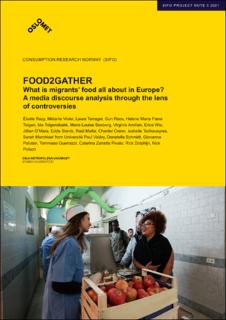FOOD2GATHER: What is migrants’ food all about in Europe? A media discourse analysis through the lens of controversies
Razy, Elodie; Vivier, Melanie; Terragni, Laura; Roos, Gun; Teigen, Helene Fiane; Tolgensbakk, Ida; Seeberg, Marie Louise; Amilien, Virginie; Wie, Erica; O'Mara, Jillian; Starck, Edda; Matta, Raul; Crenn, Chantal; Techoueyres, Isabelle; Marchiset, Sarah; Schmidt, Donatella; Palutan, Giovanna; Guerazzi, Tommaso; Pivato, Caterina Zanatta; Dolphijn, Rick; Polson, Nick
Abstract
This report is part of the HERANET funded project FOOD2GATHER. The project aims at understanding the question of integration/exclusion of migrants through foodscapes. An important step in this direction is to analyse the contextual framework within which food-related practices, norms and values are embedded in European societies. Food controversies that have raised and have been reported in the media since the “2015 migrants’ crisis” across Europe can reveal important aspects related to such norms and values and indicate possible tensions and compromises. This report presents and discusses relevant food controversies that occurred in the six countries participating in the study (Belgium, France, Germany, Italy, Norway, and the Netherlands). This will generate a contextual overview of the integration/exclusion of migrants through foodscapes. Controversy has been used as a tool and a scanner. Each of the six FOOD2GATHER teams provided two relevant controversies that have reached media attention in the last ten years. One of the two had to be related to halal food. The analysis of the controversies has been conducted by identifying issues they tackled, agents they involved, (public) spaces and situations in which controversies took place and what they produced. A comparative analysis of relevant variables related to migrations, such as the geopolitical position of the countries, organization of reception and food provision, has been conducted as well. The six countries included in the study have different traditions related to migration and have been exposed to the “migrants’ crisis” in different ways. These differences are reflected in the proposed controversies. However, some common traits tend to emerge and reveal power relationships within societies that are different or shared by the countries involved in the project. We show that these power relationships particularly deal with the right to food, citizens’ commitment, identity, the place of religion, animal welfare and political issues. Our study indicates that analysing controversies adds an important dimension to the study of foodscapes. Food controversies that reach the media attention are seldom something migrants have brought up themselves. The migrants’ representation in the media based on food controversies indicated that migrants are given little opportunity to negotiating values and practices, as norms about “the right” quantity and quality of food tend to reproduce the food model of the country they migrate to, also when there is a “positive” focus on ethnic business. To better understand these dynamics, we propose the concept of “food encounters” and illustrate how the type of food encounters can play a role in how foodscapes could evolve or even emerge.
